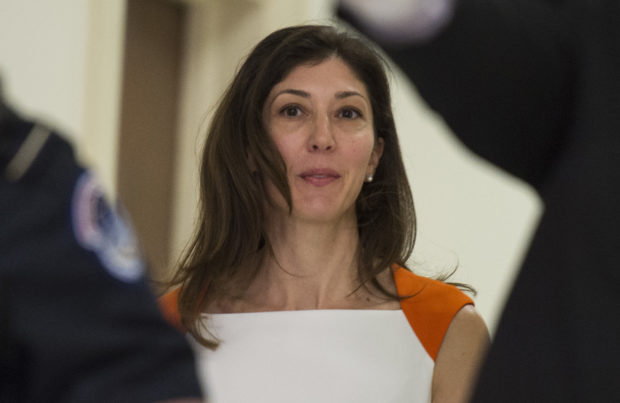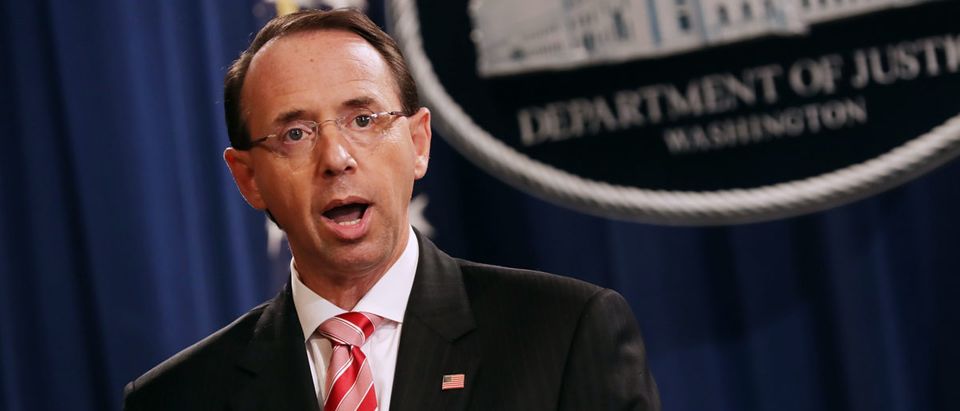Former Deputy Attorney General Rod Rosenstein acknowledged in a court filing Friday that he authorized the release of text messages between FBI officials Peter Strzok and Lisa Page to media outlets.
Rosenstein said in a declaration filed in response to a lawsuit Strzok has pending against the Justice Department and FBI that he authorized releasing the text messages to media outlets Dec. 12, 2017, the eve of his testimony before the House Judiciary Committee.
“The disclosure obviously would adversely affect public confidence in the FBI, but providing the most egregious messages in one package would avoid the additional harm of prolonged selective disclosures and minimize the appearance of the Department concealing information that was embarrassing to the FBI,” said Rosenstein, who left the Justice Department in May 2019.
Strzok, the former deputy chief of the FBI’s counterintelligence division, sued the Justice Department and FBI on Aug. 6, 2019, for unlawful termination, infringement of due process, and violations of the Privacy Act. (RELATED: Strzok Sues FBI And DOJ)
Strzok was fired Aug. 8, 2018, over anti-Trump text messages that he exchanged with Page, who served as legal counsel to former FBI Deputy Director Andrew McCabe.

Lisa Page arrives on Capitol Hill July 16, 2018 arrives to speak before the House Judiciary and Oversight Committee on Capitol Hill in Washington, DC. (ANDREW CABALLERO-REYNOLDS / AFP via Getty Images)
The existence of damning text messages between Strzok and Page was first reported Dec. 2, 2017, in stories at The New York Times and Washington Post.
The Justice Department scrambled to review and produce the texts to congressional committees who requested the communications. Rosenstein said a review of some of the messages was unexpectedly finished the day before his testimony.
He said he consulted with the Justice Department’s Office of Legal Affairs, which determined that there was no legal basis preventing the release of the messages, and the authorized the Justice Department’s Office of Public Affairs to provide 375 messages to a group of media outlets.
In one exchange, dated Aug. 15, 2016, Strzok referred to an “insurance policy” that was discussed that day in McCabe’s office during a conversation about the Trump investigation.
In an Oct. 20, 2016, message, Strzok called Trump a “f*cking idiot.” On Aug. 6, 2016, Strzok wrote “F Trump” to Page.
Rosenstein asserted that Strzok and Page’s privacy interests were not violated by releasing the messages because they “were sent on government phones with the knowledge that they were subject to review by FBI” and because they “were so inappropriate and intertwined with their FBI work that they raised concerns about political bias influencing official duties.”
He said that since he was scheduled to testify before the House, “it would be in appropriate to withhold the messages” until after his testimony.
Page, who resigned from the bureau May 4, 2018, sued the FBI and DOJ on Dec. 10, 2019, alleging violations of the Privacy Act.
She responded Saturday to Rosenstein’s court filing.
“All I can say is this: I very much look forward to Rod’s deposition,” she wrote on Twitter.
All I can say is this: I very much look forward to Rod’s deposition. https://t.co/so43a38WBh
— Lisa Page (@NatSecLisa) January 18, 2020
All content created by the Daily Caller News Foundation, an independent and nonpartisan newswire service, is available without charge to any legitimate news publisher that can provide a large audience. All republished articles must include our logo, our reporter’s byline and their DCNF affiliation. For any questions about our guidelines or partnering with us, please contact licensing@dailycallernewsfoundation.org.


